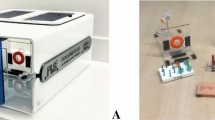Abstract
Background
The paucity of readily accessible, cost-effective models for the simulation, practice, and evaluation of endoscopic skills present an ongoing barrier for resident training. We have previously described a system for conversion of the Fundamentals of Laparoscopic Surgery box (FLS) for flexible endoscopic simulation. Six endoscopic tasks focusing on scope manipulation, and other clinically relevant endoscopic skills are performed within a 5-min time limit per task. This study describes our experience and validation results with the first 100 participants.
Methods
A total of 100 participants were evaluated on the simulator. Thirty individuals were classified as experts (having done over 200 endoscopic procedures), and 70 were classified as trainees (39 individuals reported having no prior endoscopy experience). Of the 100 participants, 55 individuals were retested on the simulator within a period of 4 months. These 55 individuals were also evaluated using the “Global Assessment of Gastrointestinal Endoscopic Skills” (GAGES). T-tests and Pearson correlations were used where appropriate, values less than 0.05 were considered significant.
Results
Experts completed all six tasks significantly faster than trainees. For the 55 participants who were retested on the simulator, all tasks demonstrated evidence of test–retest reliability for both experts and trainees who did not practice in between tests. Moderate correlations between lower completion times and higher GAGES scores were observed for all tasks except the clipping task.
Conclusions
The results from the first 100 participants provide evidence for the simulator’s validity. Based on task completion times, we found that experts perform significantly better than trainees. Additionally, preliminary data demonstrate evidence of test–retest reliability, as well as GAGES score correlation. Additional studies to determine and validate a scoring system for this simulator are ongoing.
Graphical abstract




Similar content being viewed by others
References
Crespin OM, Okrainec A, Kwong AV, Habaz I, Jimenez MC, Szasz P, Weiss E, Gonzalez CG, Mosko JD, Liu LW, Swanstrom LL, Shlomovitz E (2018) Feasibility of adapting the fundamentals of laparoscopic surgery trainer box to endoscopic skills training tool. Surg Endosc 32(6):2968–2983
Thompson CC, Jirapinyo P, Kumar N, Ou A, Camacho A, Lengyel B, Ryan MB (2014) Development and initial validation of an endoscopic part-task training box. Endoscopy 46:735–744
Vassilou MC, Kaneva PA, Poulose BK, Dunkin BJ, Marks JM, Sadik R, Sroka G, Anvari M, Thaler K, Adrales GL, Hazey JW, Lightdale JR, Velanovich V, Swanstrom LL, Mellinger JD, Fried GM (2010) Global assessment of gastrointestinal endoscopic skills (GAGES): a valid measurement tool for technical skills in flexible endoscopy. Surg Endosc 24(8):1834–1841
Patel NM, Terlizzi JP, Trooskin SZ (2014) Gastrointestinal endoscopy training in general surgery residency: what has changed since 2009? J Surg Educ 71(6):846–850
Van Sickle KR, Buck L, Willis R, Mangram A, Truitt MS, Shabahang M, Thomas S, Trombetta L, Dunkin B, Scott D (2011) A multicenter, simulation-based skills training collaborative using shared GI Mentor II systems: results from the Texas Association of Surgical Skills Laboratories flexible endoscopy curriculum. Surg Endosc 25(9):2980–2986
Koch AD, Buzink SN, Heemskerk J, Botden SM, Veenendaal R, Jakimowicz JJ, Schoon EJ (2008) Expert and construct validity of the Simbionix GI Mentor II endoscopy simulator for colonoscopy. Surg Endosc 22(1):158–162
Hashimoto DA, Petrusa E, Phitayakorn R, Valle C, Casey B, Gee D (2018) A proficiency-based virtual reality endoscopy curriculum improves performance on the fundamentals of endoscopic surgery examination. Surg Endosc 32(3):1397–1404
Ritter EM, Taylor ZA, Wolf KR, Franklin BR, Placek SB, Korndorffer JR, Gardner AK (2018) Simulation-based mastery learning for endoscopy using the endoscopy training system: a strategy to improve endoscopic skills and prepare for the fundamentals of endoscopic surgery (FES) manual skills exam. Surg Endosc 32(1):413–420
Jirapinyo P, Abidi WM, Aihara H, Zaki T, Tsay C, Imaeda AB, Thompson CC (2017) Preclinical endoscopic training using a part-task simulator: learning curve assessment and determination of threshold score for advancement to clinical endoscopy. Surg Endosc 31(10):4010–4015
Jirapinyo P, Kumar N, Thompson CC (2015) Validation of an endoscopic part-task training box as a skill assessment tool. Gastrointest Endosc 81:967–973
Berger-Richardson D, Kurashima Y, von Renteln D, Kaneva P, Feldman LS, Fried GM, Vassiliou MC (2016) Description and preliminary evaluation of a low-cost simulator for training and evaluation of flexible endoscopic skills. Surg Innov 23(2):183–188
Eldo FE, Halldorsson A, Griswold JA (2008) Future directions in training surgical residents to perform endoscopic examinations. Am Surgeon 74(2):187–188
Lee SH, Chung IK, Kim SJ, Kim JO, Ko BM, Hwangbo Y, Kim WH, Park DH, Lee SK, Park CH, Baek IH (2008) An adequate level of training for technical competence in screening and diagnostic colonoscopy: a prospective multicenter evaluation of the learning curve. Gastrointest Endosc 67(4):683–689
Acknowledgements
The authors thank Jaime Burke, Caterina Masino, Agnes Gronfier, Anton Svendrovski for their support throughout this study and Thomas Sun for helping make the BEST box. This study was funded by a 2017 SAGES research grant provided to University Health Network/University of Toronto (FC#410007741).
Author information
Authors and Affiliations
Corresponding author
Ethics declarations
Disclosures
Ilay Habaz, Silvana Perretta, Allan Okrainec, Oscar M Crespin, Andrea V Kwong, Ethan Weiss, Else van der Velden, Ludovica Guerriero, Fabio Longo, Pietro Mascagni, Louis WC Liu, Timothy D Jackson, Lee L Swanstorm, and Eran Shlomovitz have no conflict of interest or financial ties to disclose.
Rights and permissions
About this article
Cite this article
Habaz, I., Perretta, S., Okrainec, A. et al. Adaptation of the fundamentals of laparoscopic surgery box for endoscopic simulation: performance evaluation of the first 100 participants. Surg Endosc 33, 3444–3450 (2019). https://doi.org/10.1007/s00464-018-06617-6
Received:
Accepted:
Published:
Issue Date:
DOI: https://doi.org/10.1007/s00464-018-06617-6




